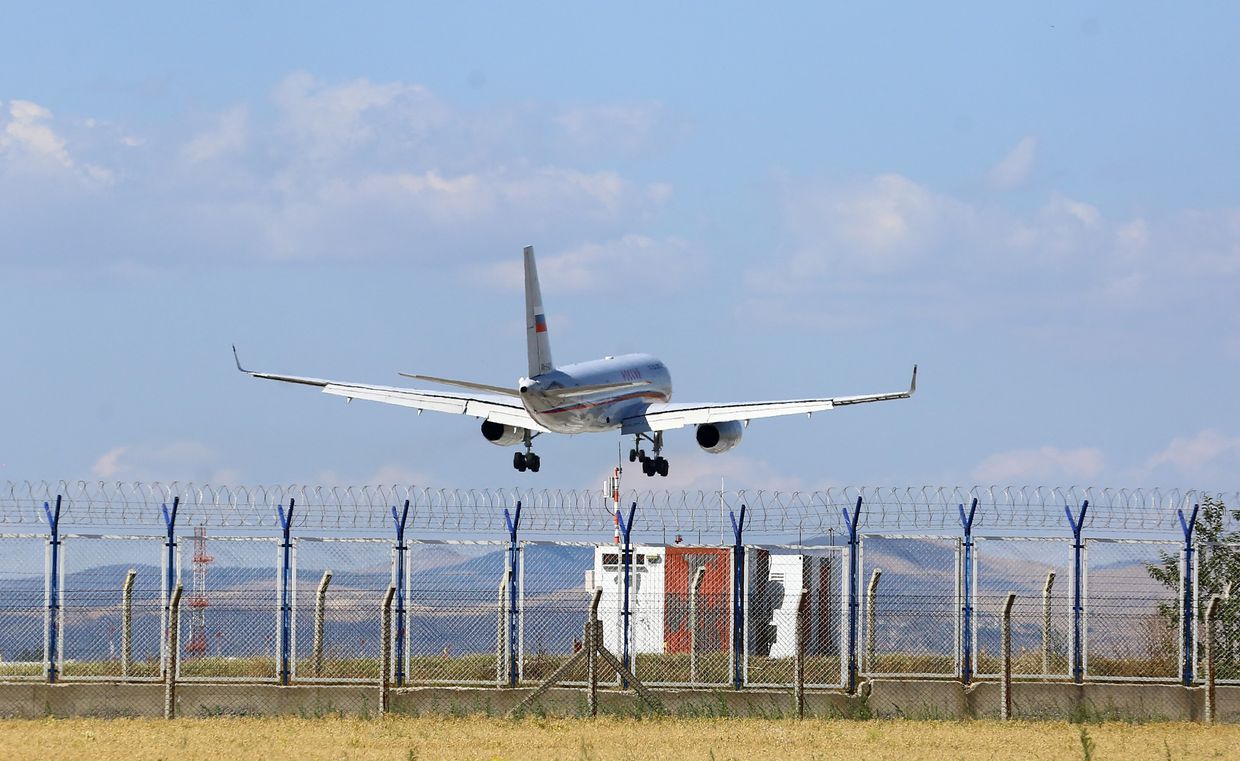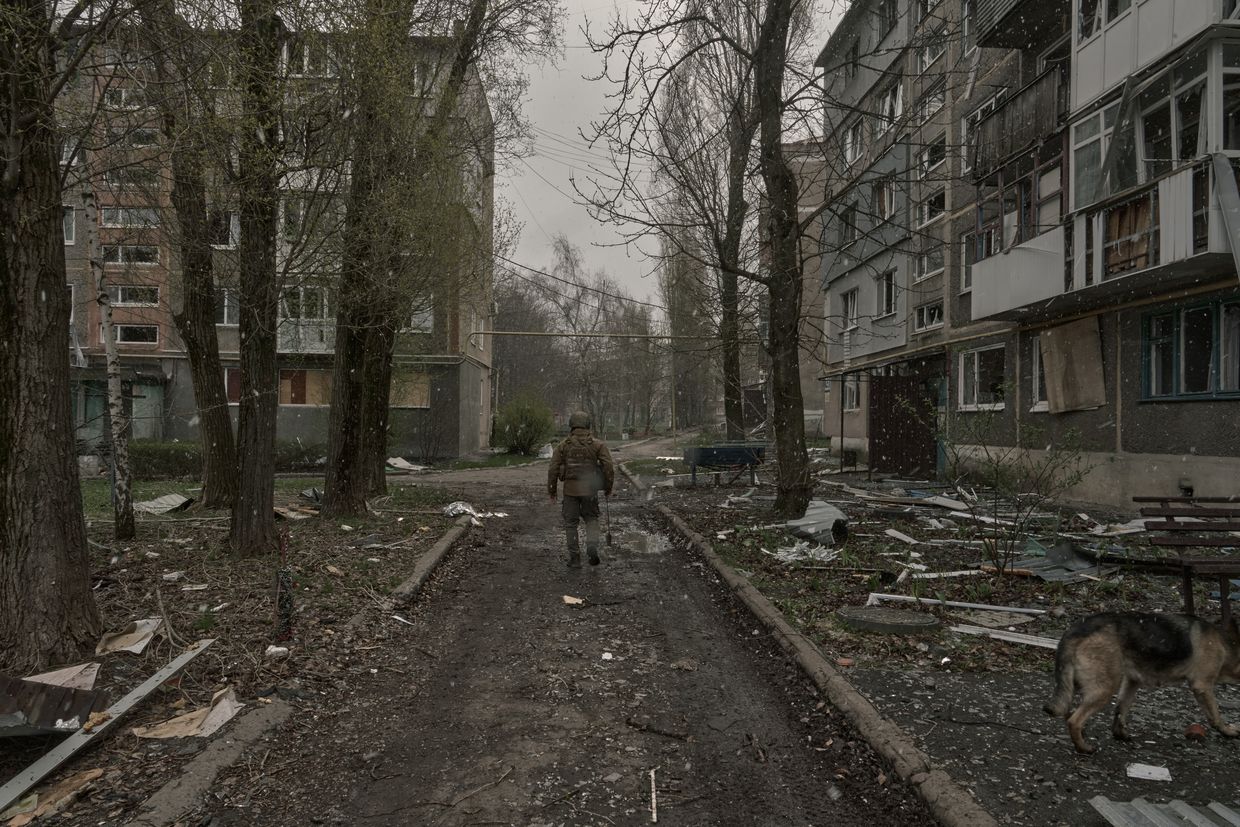KANANASKIS, Canada — The Group of Seven (G7) Leaders' Summit ended on June 17 with no joint statement in support of Ukraine, no commitments to provide desperately needed U.S. weapons, and no meeting between President Volodymyr Zelensky and U.S. President Donald Trump.
The Ukrainian delegation headed into the summit, held in the remote community of Kananaskis, Canada, with an air of cautious optimism and hopes of winning renewed international support.
Instead, Trump left, Russia slammed Kyiv with ballistic missiles, and optimism quickly turned to anxiety.
As Zelensky arrived in Kananaskis on June 17, Moscow hit Kyiv with one of the largest Russian attacks on the capital since the start of the war — a brutal strike that killed 28 people and injured 134.
Zelensky, who learned of the attack en route to Canada, hoped to once again rally world leaders around Ukraine's defense and convince them to mount pressure on Russia in light of the relentless attacks on civilians. But Trump — the man with the most power to impact the course of the war and prospects for peace — met the moment with indifference.
Trump departed the summit just hours ahead of Zelensky's arrival, saying he was leaving to tend to a different conflict: "I have to be back (to the White House) as soon as I can ... because of what's going on in the Middle East," Trump told reporters, referring the escalating conflict between Israel and Iran. "I have to be back early for obvious reasons," Trump said, without further elaborating.
Trump was expected to meet with Zelensky on the sidelines of the G7 summit on June 17, marking their third in-person meeting since the American president took office in January. After his sudden exit, the Ukrainian delegation was left with the impression that Trump had brushed off their concerns.
While Kyiv managed to make progress and maintain unity among remaining world leaders at the summit, the bleak state of U.S.-Ukrainian relations casts a shadow over these gains. Zelensky left the summit early, with even more uncertainty about how Ukraine can win the war in the face of dwindling U.S. support.
Relations with Trump continue to sour
After a disastrous first in-person meeting between Trump and Zelensky in the Oval Office in February — during which Trump and Vice President JD Vance lambasted the Ukrainian president over what they described as "a lack of gratitude for U.S. support" — a second meeting in the Vatican helped smooth over tensions between the two leaders.
Zelensky praised his brief but "most substantive" conversation with Trump following the funeral of Pope Francis in early May.
"With all due respect to our teams, the one-on-one format, in my opinion, worked. We had the right atmosphere for the conversation," Zelensky said after the talk.
At the G7 summit, the Ukrainian delegation hoped to convince Trump to exert additional economic pressure on Moscow through sanctions — which the U.S. president has not followed through on implementing — during a third in-person meeting with Zelensky.
Trump's exit put those hopes on hold and cost Ukraine an opportunity to improve relations with the White House. Sources familiar with the situation told the Kyiv Independent that there was resounding disappointment within the president's circle.
Zelensky ended up leaving the summit early too, canceling a planned press conference and additional events in Calgary in the wake of the Russian missile strikes on Kyiv and changes to the G7 agenda.
"What is there (for Zelensky) to say?" a source familiar with the logistics of Zelensky's canceled press conference said following Trump's early departure.
Kyiv's hopes of winning over Washington have run up against Trump's indifference to a Ukrainian victory and his sympathies with the Kremlin. One expert told the Kyiv Independent that Trump "does not share (the) commitment" that other Western allies do to help put an end to the war.
"Trump seems to be walking away from an attempt to reach a ceasefire in the war, and is focused on the Israel-Iran conflict and U.S. domestic politics," said Brian Taylor, a professor of political science at Syracuse University.
"Of course, Trump is unpredictable and could change his mind (about providing support for Ukraine), but it seems pretty clear that, for whatever reason, he sympathizes with (Russian President Vladimir) Putin," Taylor said.
"It looks like President Trump is walking away from his erratic and half-hearted efforts to make a deal to end the Russia-Ukraine War."
Trump's lack of commitment has Ukraine questioning the value of participating in the upcoming NATO summit in The Hague. Zelensky is reconsidering his attendance at the June 24-25 summit amid questions over Trump's participation, the Guardian reported on June 17, citing unnamed Ukrainian officials.
One official told the Guardian that Ukraine is in a "permanent hazard" of becoming a victim of "Trump's short attention span," adding that Russia has exploited this uncertainty by fresh aerial attacks. The source said there had been "all sorts of promises for this summit," including U.S. arms.
Minor victories, major uncertainties
Despite Trump's abrupt departure, Zelensky did come out of meetings with other world leaders with some positive results as well as additional support for Ukraine.
Canadian Prime Minister Mark Carney, the host of the summit, announced a sweeping new support package for Ukraine during a bilateral meeting with Zelensky. The measures include two billion Canadian dollars ($1.5 billion) in military funding and new sanctions aimed at restricting Russia's energy revenues and evasion tactics.
"To be absolutely clear, this support will be unwavering until we get a just peace for Ukraine and the Ukrainian people," Carney said ahead of the bilateral, attended by the Kyiv Independent.
Additionally, the United Kingdom imposed new restrictions on Russia on June 17, adding 20 vessels from Russia's so-called "shadow fleet" and 10 individuals and entities to its sanctions list. Australia also joined the U.K. in targeting 60 vessels — its first-ever sanctions against the shadow fleet.
Zelensky said he had told the G7 leaders that "diplomacy is now in a state of crisis" and urged allies to press Trump "to use his real influence" to force an end to the war.
Trump has not been very responsive to such appeals. During a G7 dinner discussion where world leaders reportedly attempted to convince Trump to impose tougher sanctions against Russia, Trump insisted sanctions were too costly for the U.S., according to Bloomberg.
The New York Times reported in May that Trump opposes sanctions because they may jeopardize future business and trade opportunities with Moscow.
While Zelensky pushes for the support and sympathy of Western leaders, the U.S. pushes back — often with disappointing results for Ukraine. Canada reportedly dropped plans for the G7 to issue a joint statement on the war in Ukraine after the U.S. insisted on weakening the language. Instead of a unified call to action, Canada's Carney released a Chair's Summary on the event.
"I think the possibility of additional pressure on Russia from the United States, in the form of tougher sanctions and further military assistance for Ukraine, are low," Taylor said. "The good news for Ukraine from the G7 Summit is that the other six members of the G7 remain firmly behind Ukraine."
Making Moscow pay
Ukraine's military has warned that Russian forces have intensified operations across the front line amid a renewed summer offensive — meaning Ukraine desperately needs external forces to exert economic pressure on Russia's war machine.
"The key questions now are, first, will the U.S. Congress try to force Trump into further sanctions and, second, how much can Europe make up for the absence of U.S. support?" Taylor told the Kyiv Independent.
A U.S. sanctions bill, jointly introduced on April 1 by Republican Senator Lindsey Graham and Democratic Senator Richard Blumenthal, seeks to impose a 500% tariff on imports from countries that continue purchasing Russian oil and raw materials. The bill aims to tighten economic pressure and discourage third-party nations from enabling the Kremlin's energy profits.
Despite broad support for these efforts from his own party, Trump asked Senate Majority Leader John Thune to postpone a vote on the bill, according to Senator Roger Wicker. Semafor reported on June 17 that the bill has been further delayed until at least July as Congress grapples with domestic legislation as well as the conflict in the Middle East.
While the European Union insists that its commitment to Ukraine remains unwavering, the bloc is also vulnerable to U.S. pressure and internal disagreements.
In its 18th package of sanctions against Russia, the EU proposed lowering the oil price cap from $60 to $45 a barrel. While leaders were reportedly prepared to champion the proposal even without support from the U.S., European Commission President Ursula von der Leyen appeared to walk back the price drop during the G7 summit.
"In the last days, we have seen the price has risen so the oil price cap does serve its function," von der Leyen said. "At the moment, there's little pressure on lowering the oil price cap."
EU High Representative Kaja Kallas, however, urged the EU to press forward with lowering the cap on Russian oil, even without U.S. support, warning that Middle East tensions could otherwise drive prices up and boost Russia's revenues.
The EU also requires unanimous support on punitive measures related to Russia, giving Ukraine-skeptic leaders in Slovakia and Hungary an opportunity to obstruct and delay the approval process.
Prospects for peace in Ukraine will likely be determined by the amount of economic strain exerted on Russia. Kyiv now faces tough decisions as to how to publicly court support from Trump without relying too heavily on Washington's global leadership.
Kyiv may soon be forced to put all its efforts into winning more European support, becoming reliant on allies with more limited capabilities.



















